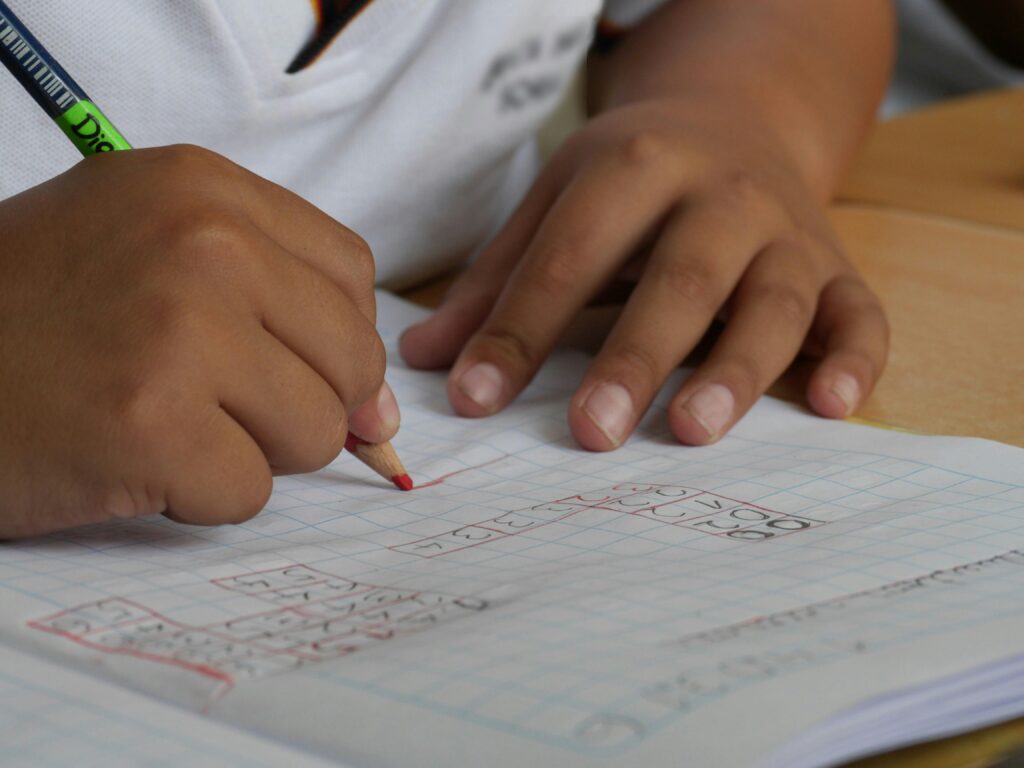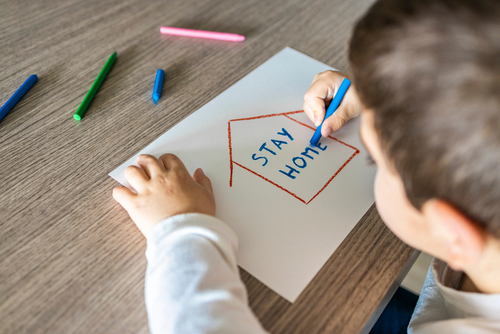
Montessori
I want to talk about Maria Montessori because Montessori is a popular alternative education which some home-educators use. Have you ever studied her work and has it had a place in your home-schooling?
I know a little about her methodology as some of my children went to a Montessori nursery when they were little. The one school I’ve ever fallen in love with was a Montessori school – it had a wonderful, organic feel and the kids had lots of time in nature and time to play. If we’d had the resources, we’d have seriously considered putting our children in that school.
So, you’re a fan?
There are some things I really like about the Montessori approach. She and her colleagues observed children in a scientific, logical way and developed a system and tools to facilitate their learning in something approaching a holistic, empathic manner. I think she wanted to understand children and work with them rather than overpower them.
What aspects of her methodology have you used?
A couple of her observations have helped me over the years. One was that children go through sensitive periods of learning and it’s best to wait for them to happen and then run with it, rather than pushing children to learn before they’re ready. This is why I’ve never made my children learn letters or reading when they’re little, but have left them to play and waited until their brains were ready.
Another observation she made, along with other educationalists such as Charlotte Mason and John Holt, is that children naturally want to learn – educators shouldn’t need to fight children or bully them to learn as it’s an innate drive. If we do it properly, we can work with our children and not battle against them.
The modern, mainstream education system doesn’t take either of those into account, does it? It seems like educationalists spend a lot of time trying to make children learn, either through rewards or punishments. And all children are expected to learn according to National Curriculum guidelines.
Absolutely. I’ve observed some of my own children were far behind their friends in school, until they hit a sensitive period and then they caught up and often overtook the children who had, I think, been prematurely pushed. I’m convinced that a lot of the rebellion and reluctance young people have for structured learning, and their resentment of authority, is due to them being pushed too hard, too young, in the wrong ways.
Did all your children catch up after they’d fallen behind?
Some of my children have special needs (dyslexia, dysgraphia and/or dyscalculia) and they will never be as fluent as other people without those issues.
Have you ever had a child who just hasn’t wanted to learn, a refuser who’s needed a push to get them going?
My children sometimes need to be told that it’s now time to sit down and do some bookwork – it’s natural that they’ll want to push their boundaries. In the same way they might not want to brush their teeth or change their socks. A bit of structure and direction (in my view) are beneficial. Just as clean teeth and socks are good, so is doing some maths.
However, where a child has persistently shown deep, insurmountable dislike of a subject or lesson, then we’ll listen.
Why haven’t you adopted Montessori wholeheartedly in your home-education?
Maria Montessori and her colleagues began working with children in an asylum. Later, she opened a school for children in a neighbourhood when their parents were working; the children were running wild and needed controlling. The point is that she was designing a system for children in an institution, a school, without their parents around. Her system is not designed for children at home with a parent.
How so?
For starters, the learning space is important in Montessori. It needs to be calm, neat, organised; a space where certain rules are followed and children’s behaviour is controlled – this is normal for a school where the purpose of the whole building is children learning, but it wouldn’t work in my home, which is not a school. With so many of us in the house, all with our own lives, hobbies, pets and work to do, it isn’t realistic to have a ‘school space’ set aside for Montessori activities only where the rules and atmosphere are different from the rest of the home. I haven’t ever aimed to control my children to the degree children are controlled in school (that’s partly why I’m home-schooling) and I definitely don’t want to turn my home into a mini-Montessori school.
The apparatus Montessori designed for children to manipulate and learn through need to be used in a specific way and Montessori teachers are trained to facilitate that. I’m a mother at home, not a Montessorian; I haven’t been properly trained in her methodology.
Additionally, when my children went to the Montessori nursery, I found the rules around children’s behaviour, learning and handling equipment, could verge on dogma and that isn’t what I want. Finally, the equipment (while very clever) is generally expensive to buy or time-consuming to make and it takes up space.
At this point, I have to question if your children would be better in school, where they’d have trained teachers, designated learning space and the proper equipment?
Well, if you want your children to go to a Montessori school then that’s fine by me. But I am a home-educator and I’m not trying to replicate any school in my home, including Montessori; that isn’t what I’m about. I’m not looking at schools, even alternative ones, with the eyes of longing and regret.
How did your children do in the Montessori nursery?
It was a mixed bag, though overall it was good for them for a while. I put some of them into nursery when I was certain they had needs I couldn’t fulfil at home. An example is that my first son went to nursery to play with children his age when his younger brother was a baby.
Can you give an example of a Montessorian principle you disagree with and explain why?
Well, one is the idea that young children can’t differentiate between fact and fiction, so they should only have books and stories grounded in reality. However, I’ve observed my children (even at a young age) love fictional stories and they quickly learn to differentiate between fantasy and fact. A child who reads Peter Rabbit, for example, doesn’t expect rabbits to hop around the countryside in little blue jackets and drink chamomile tea from little rabbit sized tea cups. Children like fiction as it is fun and stimulates imagination.
I also found that certain principles, which make sense if you want a calm, quiet, learning space for a class, aren’t ideal for individual children all the time. Children in a Montessori class might be stopped playing a make-believe game with maths equipment, for example. I’d prefer my children mostly be left alone to explore freely and play. But, if you’ve got a class of children, all working in the same space, the smooth running of the group and control necessarily take priority.
Any last thoughts about Montessori and home-schooling?
As with everything else, the best person to ask is going to be someone who is both successful and experienced; a Montessori home-schooler who’s got tangible results and has made it work for years. I’m not that person!
Katie Holden





Responses